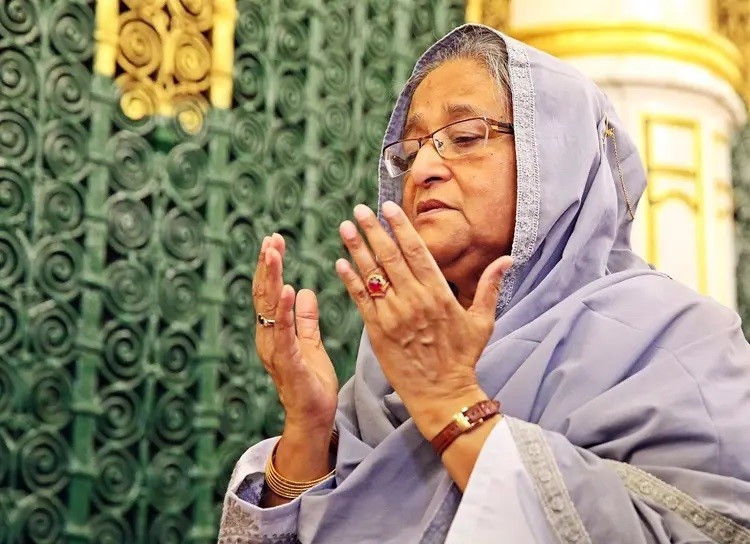Sheikh Hasina is an Islamophobic!
Why is she being labelled as anti-Islamic by the general public?
Daily Sun Report, Dhaka
Published: 03 Sep 2024

Deposed prime minister Sheikh Hasina. Photo: Collected
"Upon waking up in the morning, what do I search for? I look for my prayer mat. As soon as I wake up, I perform my prayers." These were the words of Sheikh Hasina, the recently ousted prime minister of Bangladesh.
Sheikh Hasina used to start her days with prayers, a routine she claimed was integral to her life. In 2009, when she took the oath as prime minister, she was reportedly holding a Tasbih (prayer beads).
And yet, in spite of her deep devotion to religion, she has faced glaring accusations of oppressing and persecuting Islamic scholars (Alem). But why so? Why is she being labelled as anti-Islamic by the general public?
During Sheikh Hasina’s tenure, several incidents occurred where students from madrasas (Islamic religious schools) were killed in indiscriminate shootings. Madrasas were falsely branded as breeding grounds for extremists.
Matiur Rahman Rentu, a former assistant to Hasina and a freedom fighter, wrote in his book, "Amaar Fashi Chai," that Hasina had a strong dislike for devout Muslims. He also alleged that she used religion and its practices as tools to gain popularity. Rentu further noted how Hasina used to publicly announce her prayers over loudspeakers.
On 5 August, amidst student-led protests, Sheikh Hasina resigned as premier and fled the country. Since her resignation, numerous accusations of wrongdoings have surfaced against her.
For example, Faiyaz, a 17-year-old arrested during the movement, mentioned in an interview with a private TV channel that while he was being held at the Detective Branch (DB) office, prayers were regularly arranged. However, the activities of detainees were closely monitored on CCTV, and if someone was seen praying, he would be branded as an activist of the Islamic student group Shibir.
A student from Jahurul Haq Hall at Dhaka University said that for six months, he had to secretly perform his obligatory prayers in the bathroom because members of the student wing of Hasina’s party, Chhatra League, would monitor who was praying. If anyone was caught praying, he would be labelled as a Shibir activist. Additionally, Professor Wahiduzzaman, believed to be a confidante of the Hasina-led government, last year had suggested that those who wore the hijab should study from home instead of coming to the university.
Maruf, who secured the first position in the 38th BCS (Bangladesh Civil Service) examination, was disqualified because he was a Hafiz (someone who has memorized the Holy Quran).
Furthermore, Muslim detainees in the infamous "Ayna Ghar," a favourite secret detention facility for Hasina's administration, were reportedly barred from practicing their religion. They were not allowed to hear the call to prayer (Azaan). Barrister Arman, who was released from the illegal govt-run detention centre, stated that even though the faint sound of the Azaan from a distant mosque could be heard, loud music was played during prayer times to drown it out.
Another detainee, Tanvir Mahtab, recently revealed that once during his time in the illegal facility, he requested a copy of the Quran, but was denied. Instead, he was told that there was no point in reading the Quran because his God would not be able to save him.
During the rule of the Awami League, many Islamic scholars and speakers were subjected to harassment, abduction, and even murder. If any speaker spoke against the government’s oppressive policies in religious gatherings, he was to be publicly humiliated, disgraced and detained. During the quota reform movement, several Imams of mosques lost their jobs for arranging prayers for the protesting students.
In addition to these arrests and abductions, the 2013 Shapla Square incident saw the massacre of many madrasa and orphan students.
In light of these incidents and allegations, many are now arguing that Sheikh Hasina, during her 16 years in power, was the greatest adversary of Islam in Bangladesh, and under her rule, Muslims were treated as a minority.

